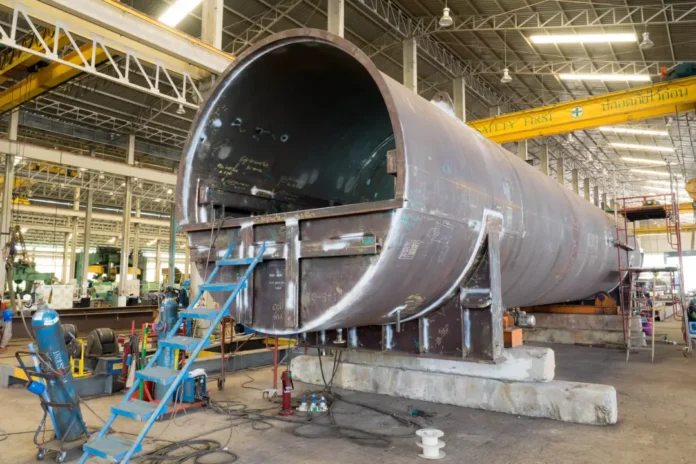The art and science of vessel fabrication are crucial in numerous industries, particularly in the production of beverages where precision, quality, and efficiency are paramount. A beverage vessels fabricator specializes in creating containers that are not only designed to meet strict industry standards but also customized to enhance the production process.
In this guide, we delve into the top 10 fascinating facts about these fabricators, shedding light on the intricate details of their work and the significant impact they have on the beverage industry. Understanding these elements can help businesses choose the right fabricator for their needs and ensure their production lines are as efficient and effective as possible.
1. Specialized Expertise in Beverage Industry
Beverage vessels fabricators possess specialized knowledge that sets them apart from general fabricators. They understand the unique requirements of the beverage industry, including the need for sanitary conditions, resistance to corrosion, and precise temperature controls, ensuring that every vessel they produce meets these critical standards.
2. Advanced Materials Used
The materials used in beverage vessel fabrication are chosen for their durability and food safety. Stainless steel is the most common material due to its resistance to corrosion and ease of cleaning. Some fabricators also use advanced alloys or coatings to enhance the functional properties of the vessels, such as improved thermal retention or resistance to acidic contents.
3. Customization is Key
Customization is a significant aspect of the work done by beverage vessels fabricators. Each vessel can be tailor-made to fit specific production needs, from size and shape to features like cooling jackets, insulation, and agitators. This bespoke approach ensures that manufacturers can optimize their processes and product quality. If you’re considering customization, a specialized Beverage Vessels Fabricator can provide insights and solutions tailored specifically to the needs of the beverage industry.
4. Emphasis on Sanitary Design
Sanitation is paramount in the beverage industry to prevent contamination and ensure product safety. Vessels fabricators design equipment with smooth, non-porous surfaces and minimized weld seams to reduce the risk of bacteria buildup. They also consider ease of cleaning and maintenance when designing and constructing vessels.
5. Innovation in Fabrication Techniques
Vessels fabricators continuously innovate to improve their manufacturing processes and the quality of their products. This includes the adoption of automated welding techniques, precision laser cutting, and computer-aided design (CAD) software, which help in creating more accurate and higher quality vessels.
6. Compliance with Industry Standards
Beverage vessels must comply with various national and international standards to ensure they are safe and effective for use. Fabricators must be well-versed in these regulations, including FDA requirements, ASME standards, and ISO certifications, among others. Compliance is not only a legal requirement but also a mark of quality and reliability.
7. Energy Efficiency Considerations
Modern vessel fabricators often design products with energy efficiency in mind. This includes incorporating features that minimize energy use during beverage production, such as advanced insulation techniques and more efficient cooling and heating systems, which can significantly reduce operational costs for beverage producers.
8. Supporting Sustainability
Sustainability is becoming increasingly important in all industries, including beverage production. Vessel fabricators contribute by using materials that are recyclable and manufacturing processes that are designed to have a lower environmental impact. They also help clients reduce their carbon footprint through more efficient designs that save on energy and resources.
9. Global Supply Chain Capabilities
Many beverage vessel fabricators operate within a global supply chain, able to source materials and sell their products worldwide. This global reach allows them to serve international markets and adhere to various regional standards and requirements, benefiting multinational beverage companies.
10. Long-term Partnerships
Successful vessel fabricators often build long-term relationships with their clients. These partnerships are based on trust, reliability, and consistent delivery of high-quality products. Long-term collaborations allow for continuous improvement in product offerings and can lead to innovations that benefit both the fabricator and the client.
Frequently Asked Questions (FAQs)
How long does it typically take to fabricate a custom beverage vessel?
The timeline can vary based on the complexity of the design and the fabricator’s current workload, but typically, it takes several weeks from design approval to completion.
What certifications should a reputable beverage vessel fabricator have?
Look for fabricators with ASME certification for pressure vessels, ISO quality certifications, and any relevant FDA or NSF certifications for food safety.
Can beverage vessel fabricators repair or modify existing equipment?
Many fabricators offer repair and modification services. They can update or modify existing vessels to meet new production requirements or to comply with updated industry standards.
How do I ensure the vessel will meet my specific production needs?
Work closely with your fabricator, providing detailed requirements and specifications. Consider requesting prototypes or 3D models to visualize the final product before full-scale production begins.
Conclusion
Choosing the right beverage vessel fabricator is essential for any beverage production business. These professionals not only provide the tools needed to produce high-quality beverages but also contribute to the overall efficiency, sustainability, and profitability of your operations. By understanding the capabilities and standards of your fabricator, you can ensure a successful partnership that benefits your production line and final product quality.


